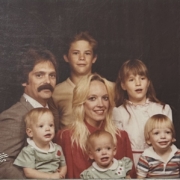It’s Not You, It’s… Actually Me: Therapy, Autism, and Learning to Be Enough
Let’s get this part out of the way: My therapist has sent me two Autism evaluations. And I keep telling her—I’m autistic. Like, this isn’t news to me. It’s not a surprise. But apparently, getting the paper trail matters.
For a long time, I minimized it. I masked it. I overcompensated. I played the part of the “functioning” mom, wife, advocate, special needs warrior, and full-time scheduler of therapies. But deep down? There’s always been this hum—a background noise of overwhelm, shutdowns, sensory overload, and social confusion I could never quite put into words.
Autistic burnout is real. Especially when you’re parenting a daughter with Pitt Hopkins Syndrome, who herself lives in a world with intense care needs and zero breaks. You’d think I’d be used to neurodivergence. But I wasn’t used to seeing it in myself.
Finding Balance from Self-Doubt
One thing therapy has taught me: I doubt myself constantly. Not in the “am I good enough?” way that shows up on self-help podcasts, but in the core, exhausting way that leaves me questioning every decision I make.
- Did I say too much in that text?
- Was I too intense in that IEP meeting?
- Should I have just stayed quiet at the family dinner?
The mental spiral is relentless. I’ve lived most of my life second-guessing myself into silence. But now? I’m slowly learning to pause and say, “Wait. What if I wasn’t wrong?”
What if that boundary I set wasn’t harsh, but necessary? What if advocating for my daughter, even when it makes people uncomfortable, is exactly what she needs from me? What if the version of me that takes up space is not only allowed—but overdue?
Balance isn’t about erasing self-doubt. It’s about not letting it run the whole damn show.
Learning That I’m Worth It
Okay, cue the eye-roll. I know “learning I’m worth it” sounds like a line ripped off a Pinterest board. But I mean it in the grittiest, least Instagram-worthy way.
- I’m worth taking a nap when I need one.
- I’m worth saying no to things that drain me.
- I’m worth accommodations—even if they make other people uncomfortable.
It’s hard. Especially as a mom. Especially as a woman. Especially as someone who has spent her whole life trying to be “easy” and “low-maintenance.” But I’m done being easy. I’m done dimming. I have a medically complex daughter who needs me functioning—not faking.
I’m learning to take up space. Not because I want to—but because I finally believe I deserve to.
Longing for Deeper Connections (Yes, Even Though Hubby’s Great)
Let me preface this by saying: My husband is solid. He’s supportive, he shows up, and he’s great with our daughter. But there’s a part of me he just doesn’t get—and honestly, I don’t think he’s supposed to.
There’s a loneliness that comes with being a neurodivergent mom to a special needs child. It’s layered, complex, and incredibly isolating. My brain is a nonstop pinball machine of anxiety, advocacy, and hypervigilance. I long for connection with people who just get it. People who don’t need everything explained.
- People who understand what masking is without a TED Talk.
- People who know what it’s like to walk into a room and scan it for sensory triggers—for you and your kid.
- People who don’t flinch when you say, “Honestly, today was just about surviving.”
This longing doesn’t mean something’s missing in my marriage. It means I’m human. And I need more than one person to be my everything.
“It’s Not You, It’s Me” (Also—It’s You): Learning Boundaries with Family
Boundaries are hard. Especially when they involve people you love. And especially when you’re the one in the family who’s always been “a lot.”
This year, I’ve started saying no. No to the family get-together that overwhelms my daughter. No to the advice I didn’t ask for. No to being the emotional dumping ground for relatives who don’t respect my time or energy.
And surprise: not everyone liked that. Some thought I was cold. Others said I was “too sensitive.” But here’s what I realized: it’s not about making them comfortable. It’s about keeping myself safe.
The more I set boundaries, the more pushback I get. But that’s fine. Because every “no” is a “yes” to myself. To my daughter. To our peace.
Autism, Therapy, and the Constant Unlearning
Being in therapy as an autistic adult—especially one who didn’t get diagnosed early—is a whole different ballgame. I’m unlearning decades of shame, people-pleasing, and masking. I’m questioning the idea that my value lies in being palatable to others.
Here’s what I’m holding onto:
- I don’t need to explain my sensory needs to earn respect.
- I don’t have to tone it down to be accepted.
- I can be direct without being rude.
I used to think my diagnosis would limit me. But it’s given me language. It’s helped me understand why the world feels so loud, why social settings drain me, and why I need structure to stay afloat.
And maybe, just maybe—it’s helping me be a better mom.
The Bottom Line: Therapy Is Hard. Being Real Is Harder. But It’s Worth It.
I didn’t write this for sympathy. I wrote it because I know I’m not the only one feeling all of this.
- The confusion of self-discovery as an adult.
- The guilt of needing more than your partner can give.
- The burnout from always being “on” for your special needs child.
- The ache for deeper connection in a world that wants you to stay surface-level.
So here I am. A neurodivergent mom in therapy. Learning to stop apologizing for existing. Fighting for my daughter, and—finally—for myself, too.
If you’re in this space with me, please know: you’re not broken. You’re becoming. You’re allowed to ask for help. To take up space. To want more.
And most of all, you’re allowed to say, “It’s not you—it’s me.” And sometimes, “No wait… it is you.”
Either way, you get to choose what stays in your life—and what no longer serves your peace.
That’s not selfish. That’s survival.




Leave a Reply
Want to join the discussion?Feel free to contribute!